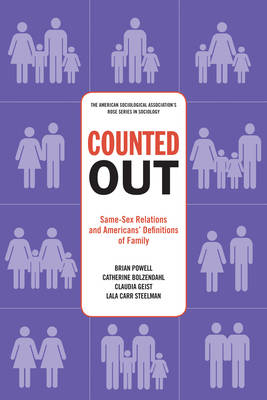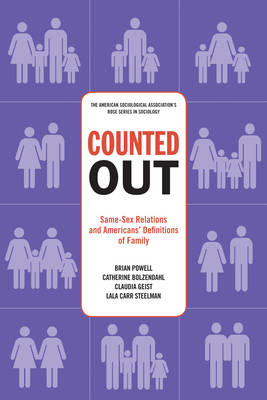
- Retrait gratuit dans votre magasin Club
- 7.000.000 titres dans notre catalogue
- Payer en toute sécurité
- Toujours un magasin près de chez vous
- Retrait gratuit dans votre magasin Club
- 7.000.0000 titres dans notre catalogue
- Payer en toute sécurité
- Toujours un magasin près de chez vous
Counted Out
Same-Sex Relations and Americans' Definitions of Family
Brian Powell, Catherine Blozendahl, Claudia Geist, Lala Carr Steelman
34,95 €
+ 69 points
Description
When state voters passed the California Marriage Protection Act (Proposition 8) in 2008, it restricted the definition of marriage to a legal union between a man and a woman. The act's passage further agitated an already roiling national debate about whether American notions of family could or should expand to include, for example, same-sex marriage, unmarried cohabitation, and gay adoption. But how do Americans really define family? The first study to explore this largely overlooked question, Counted Out examines currents in public opinion to assess their policy implications and predict how Americans' definitions of family may change in the future. Counted Out broadens the scope of previous studies by moving beyond efforts to understand how Americans view their own families to examine the way Americans characterize the concept of family in general. The book reports on and analyzes the results of the authors' Constructing the Family Surveys (2003 and 2006), which asked more than 1,500 people to explain their stances on a broad range of issues, including gay marriage and adoption, single parenthood, the influence of biological and social factors in child development, religious ideology, and the legal rights of unmarried partners. Not surprisingly, the authors find that the standard bearer for public conceptions of family continues to be a married, heterosexual couple with children. More than half of Americans also consider same-sex couples with children as family, and from 2003 to 2006 the percentages of those who believe so increased significantly--up 6 percent for lesbian couples and 5 percent for gay couples. The presence of children in any living arrangement meets with a notable degree of public approval. Less than 30 percent of Americans view heterosexual cohabitating couples without children as family, while similar couples with children count as family for nearly 80 percent. Counted Out shows that for most Americans, however, the boundaries around what they define as family are becoming more malleable with time. Counted Out demonstrates that American definitions of family are becoming more expansive. Who counts as family has far-reaching implications for policy, including health insurance coverage, end-of-life decisions, estate rights, and child custody. Public opinion matters. As lawmakers consider the future of family policy, they will want to consider the evolution in American opinion represented in this groundbreaking book. A Volume in the American Sociological Association's Rose Series in Sociology
Spécifications
Parties prenantes
- Auteur(s) :
- Editeur:
Contenu
- Nombre de pages :
- 340
- Langue:
- Anglais
- Collection :
Caractéristiques
- EAN:
- 9780871546883
- Date de parution :
- 29-03-12
- Format:
- Livre broché
- Format numérique:
- Trade paperback (VS)
- Dimensions :
- 154 mm x 229 mm
- Poids :
- 503 g

Les avis
Nous publions uniquement les avis qui respectent les conditions requises. Consultez nos conditions pour les avis.






